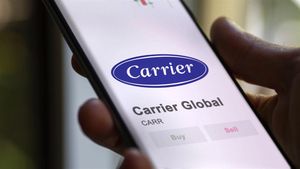Philanthropic commitments totaling $14.5 million aim to improve access to workplace and public benefits for low-to moderate-income consumers
Today, JPMorganChase announced philanthropic commitments totaling $14.5 million to support innovations in workplace and public benefits programs. These initiatives will help individuals, including those living on low- to moderate-incomes (LMI), access critical benefits such as education savings or retirement plans, that enable them to manage immediate financial needs, as well as save and build wealth. This effort is a part of the firm’s broader commitment to advance the financial health of customers and communities across the country.
Benefits play a critical role in improving the financial health of employees, particularly those earning and living on low- to moderate-incomes. Beyond wages, benefits help provide a safety net for workers to navigate their current financial lives and prepare for future goals like college and retirement. Yet fewer than one-third of gainfully employed Americans have access to workplace benefits that could help them manage critical financial needs, costing the economy nearly $183 billion per year.
“Whether it’s building a buffer for emergencies, saving for higher education, or preparing for retirement, benefits play a crucial role in helping individuals improve their financial health and build greater wealth for themselves and their families,” said Carol Lake, Global Head of Philanthropy and President of the JPMorganChase Foundation. “Modernizing and connecting benefits across the public and private sectors is essential to supporting consumers at every stage of their financial journey, creating communities where economic opportunity is accessible to all.”
Complexity of Benefits System is a Significant Barrier to Access
Beyond the workplace, many LMI workers also rely on the public benefits system but continue to face hurdles in accessing these benefits. Over $80 billion in public benefits goes untapped annually due to complex eligibility requirements, administrative barriers, and fragmented delivery systems.
While public and workplace benefits are often viewed as separate, they are deeply intertwined for LMI consumers who navigate between the two to manage their day-to-day financial expenses, cover short-term needs, and plan for the future. Modernizing and connecting the benefits system across the public and private sectors to ensure people have access to, and utilize, a full suite of benefits that meets their needs, is more crucial than ever before.
A New and Expanded Philanthropic Approach
Funding to support organizations working to modernize the benefits systems and increase access to critical support for workers include:
- $7 million to Commonwealth: Commonwealth will partner with large employers and benefits providers in Columbus, Chicago, and nationally, to pilot and scale workplace benefits programs that improve the financial health of 2.5 million consumers. $1 million of that commitment will touch down in Columbus to build a local cohort of employers and benefits providers committed to this work.
- $3 million to Code for America: Code for America's AI Studio designs and deploys technology-enabled solutions in partnership with state agencies to increase access to public benefits for all Americans nationwide. Through human-centered design, this program will apply AI solutions on common challenges, creating efficiencies across multiple states and benefit programs.
- $1.58 million to Washington University: Washington University is conducting research into the role of public and workplace benefits in supporting the financial well-being of LMI workers, elevating actionable policy recommendations. For example, they found that less than half of low-wage workers had access to an employer-sponsored retirement plan and only a third were actually enrolled, leaving more than 40% of low-wage workers with nothing saved for retirement. Expanding the pool of employers offering retirement plans, promoting automatic enrollment, and offering incentives, is a key pathway to improving retirement security.
- $1.5 million to the Aspen Institute Financial Security Program: Through this funding, the Aspen Institute Financial Security Program works to scale workplace emergency and retirement savings programs and advance efforts to bridge public and private benefits systems. By approaching these solutions holistically with a wide variety of cross-sector leaders, Aspen FSP aims to help all Americans comfortably afford everyday life, save for rainy days, and invest in their futures.
- $500K to the Financial Health Network: The Financial Health Network will research to find key benefits and workplace policies that help improve workers' financial health. Initial findings suggest that benefits, such as retirement plans, enhance the effectiveness and impact of other benefits for employees.
- $500K to Women’s Money Matters: Women’s Money Matters, as part of a coalition of groups with SpringfieldWORKS, will advance a new pilot helping low-income families in Massachusetts navigate the “benefits cliff” and transition to long-term economic mobility, while producing actionable insights to inform sustainable policy change.
- $500K to LiftUp Communities: Across Chicago, LiftUp is partnering with social enterprises to strengthen pathways to upward economic mobility for low-wage workers through innovations in holistic employer benefits practices and tailored wraparound supports.
"American workers deserve to not only get by today, but to build wealth for a brighter future,” said Timothy Flacke, CEO of Commonwealth. “Workplace benefits hold one key to unlocking this potential, turning wages into financially secure families.”
JPMorganChase’s Support for Employee Financial Health
This work builds on JPMorganChase’s holistic efforts to improve financial health outcomes for employees – both within the firm and with employers across the country. In the U.S., JPMorganChase offers a variety of programs – ranging from 401(k) retirement plans and employee stock purchase opportunities to unlimited one-on-one financial coaching sessions and access to programs focused on preparing for the costs of higher education.
“At JPMorganChase, our employees work hard to strengthen our communities and make dreams possible for our customers every day – and it’s important we support them with a comprehensive and top-tier benefits package that goes beyond the basics and lends support through life’s milestones,” said Bernadette Branosky, Global Head of Benefits at JPMorganChase. “We’re committed to helping our employees manage their financial lives, prepare for the unexpected, and build a foundation to reach their short, medium, and long term goals.”
Learn more about how JPMorganChase is supporting the financial health of individuals and communities here.
About JPMorganChase
JPMorgan Chase & Co. (NYSE: JPM) is a leading financial services firm based in the United States of America (“U.S.”), with operations worldwide. JPMorganChase had $4.4 trillion in assets and $351 billion in stockholders’ equity as of March 31, 2025. The Firm is a leader in investment banking, financial services for consumers and small businesses, commercial banking, financial transaction processing and asset management. Under the J.P. Morgan and Chase brands, the Firm serves millions of customers in the U.S., and many of the world’s most prominent corporate, institutional and government clients globally. Information about JPMorgan Chase & Co. is available at www.jpmorganchase.com.
View source version on businesswire.com: https://www.businesswire.com/news/home/20250430105812/en/
Contacts
Kevin Boland
kevin.boland@jpmchase.com






